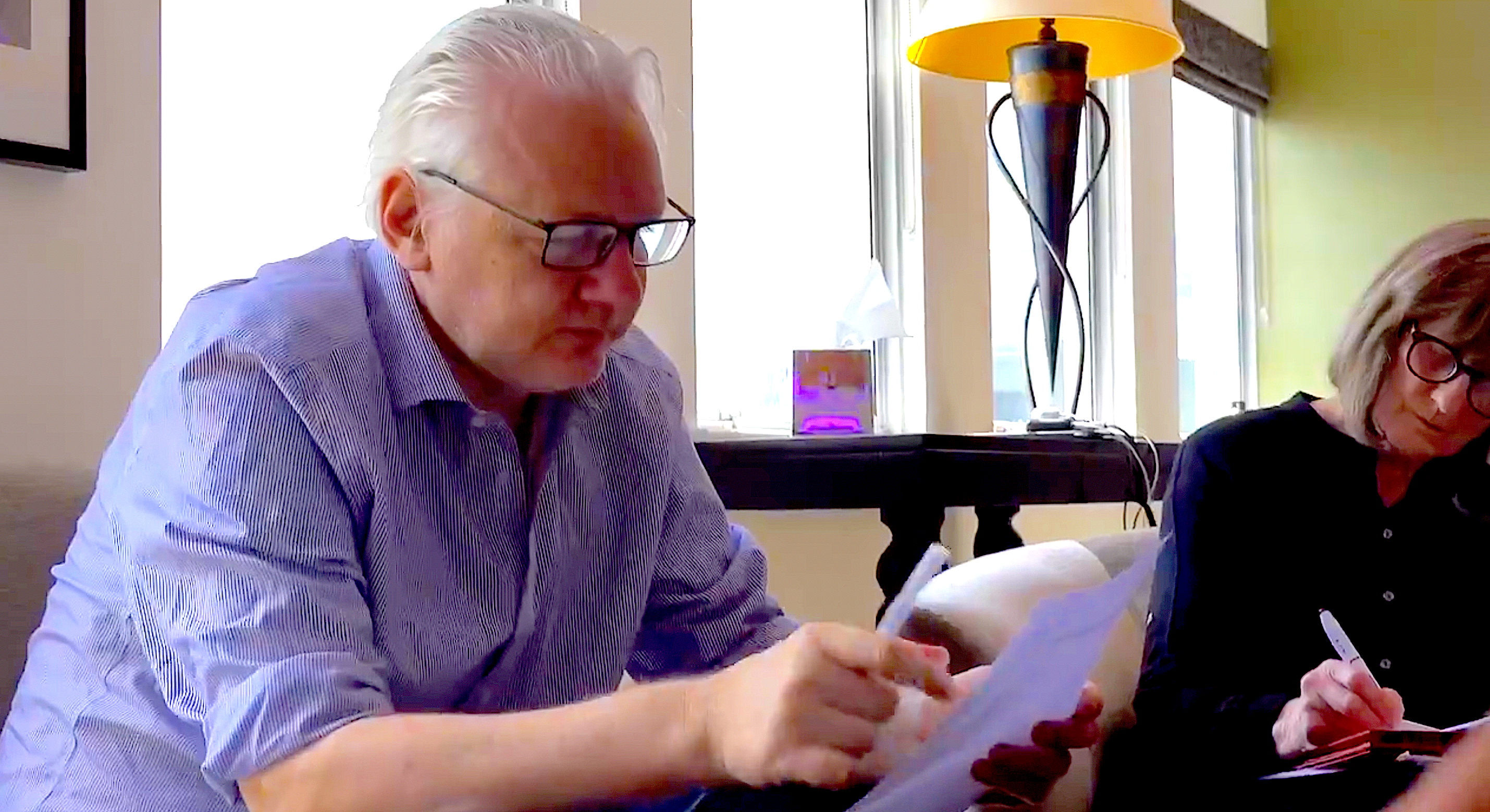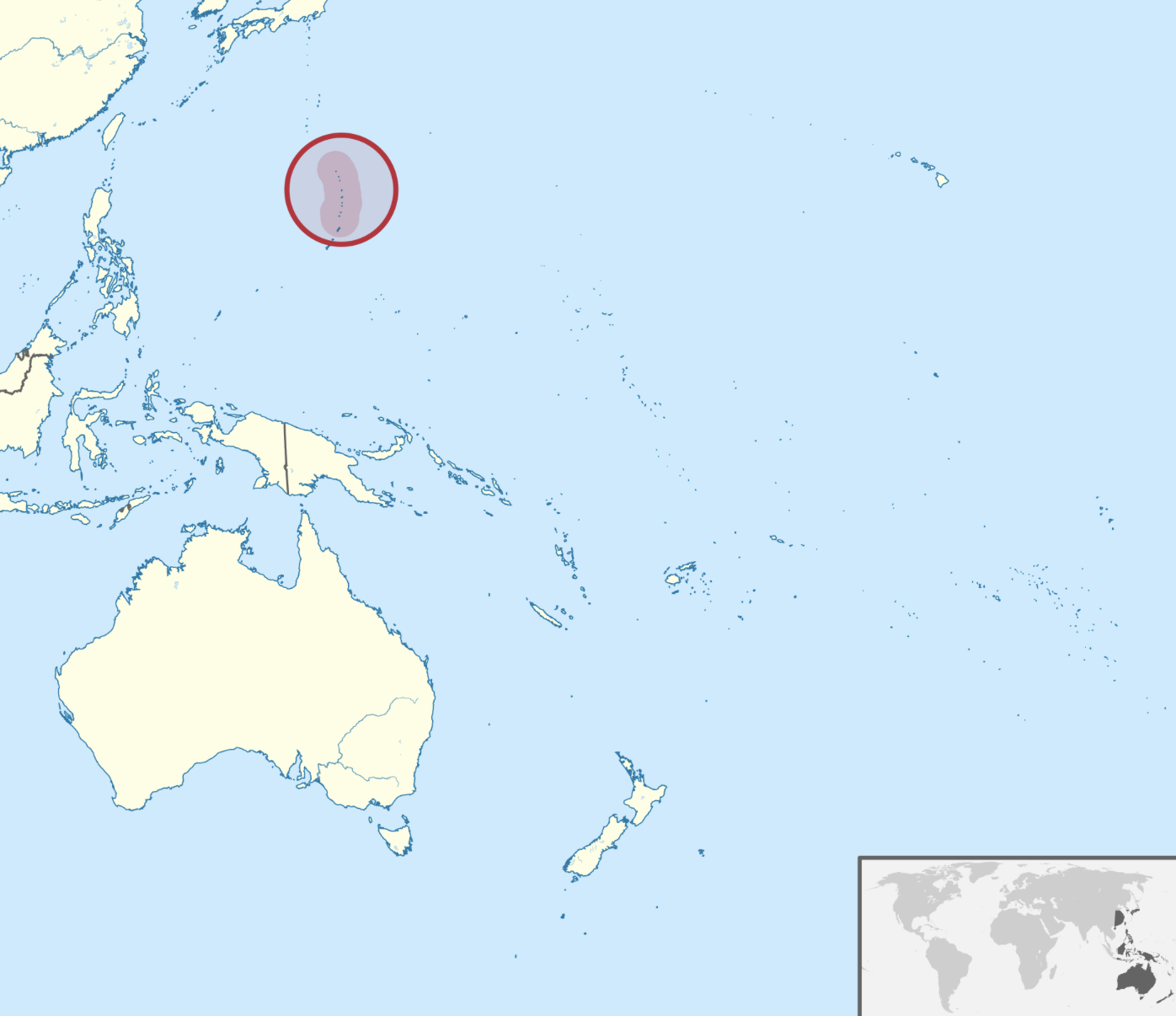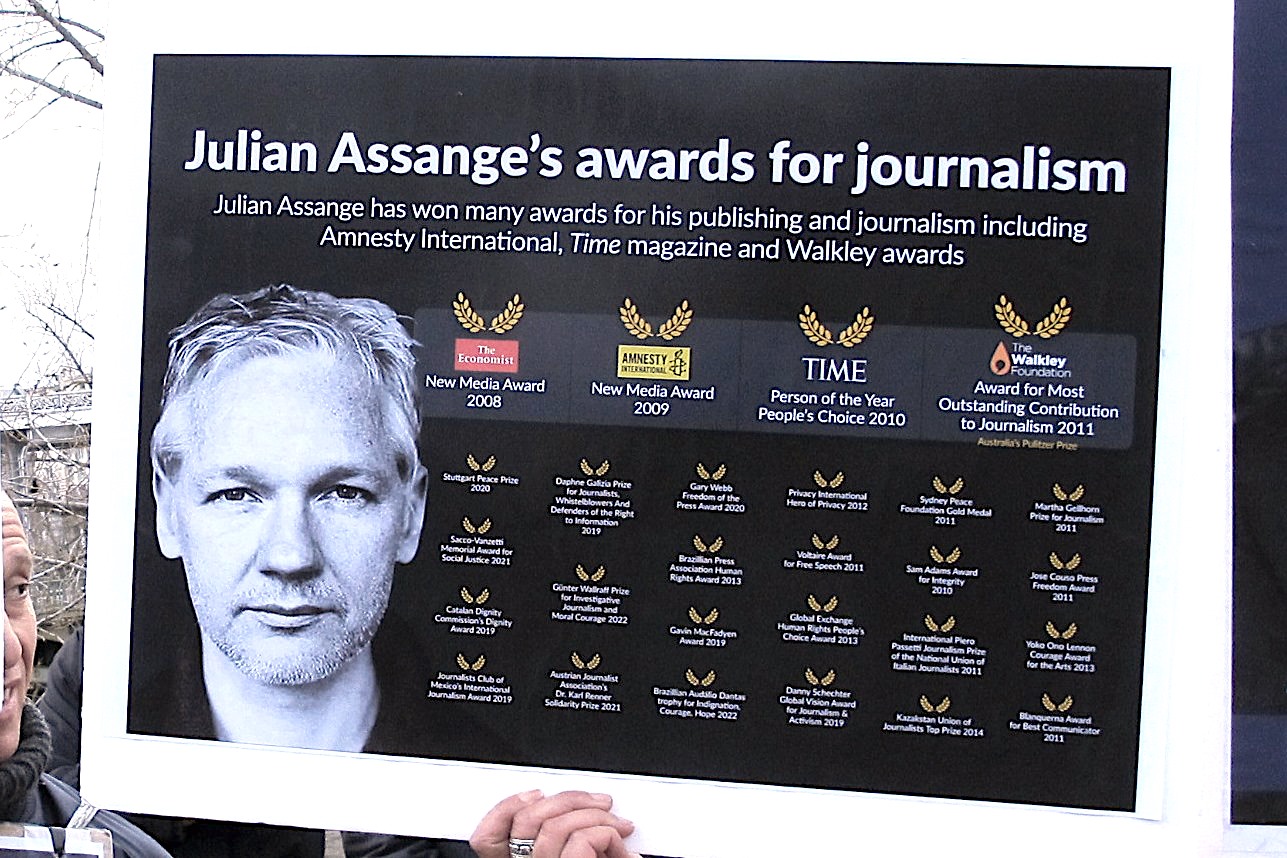The WikiLeaks founder consistently displayed strength and endurance as the machinery of two sovereign states attempted to destroy him.

Assange discussing the plea deal with his lawyer Gareth Pierce. (WikiLeaks via X)
By Patrick Lawrence
The Floutist

After apparently lengthy negotiations via Julian Assange’s attorneys, the WikiLeaks founder agreed to plead guilty to one felony charge of illegally obtaining and publishing U.S. government documents of various kinds — many standing as evidence of war crimes and human rights abuses, others exposing the Democratic Party’s corruptions during the presidential campaign of Hillary Clinton in 2016.
Assange was sentenced Wednesday to a term of five years and two months, precisely the time he spent at Belmarsh, the maximum-security prison in southeast London. It was from Belmarsh that Assange fought requests for his extradition to the U.S., where he would have faced multiple charges and a lengthy sentence under the 1917 Espionage Act. When he departed for Australia at the conclusion of the proceeding in Saipan, the largest of the Northern Marianas and also the capital city, he became a free man for the first time in 14 years, counting from his time under house arrest in 2010.
Let us take the utmost care with our diction at this surprising and welcome turn. This will enable us to fathom the moment clearly.
Julian Assange has not been freed, passive voice, the beneficiary of decisions taken by the American and British judiciaries — and almost certainly in the Biden regime’s upper reaches. Julian Assange has achieved his freedom, actively. Even during the darkest moments of his years under house arrest, in asylum at Ecuador’s London embassy, and at Belmarsh, he never surrendered his sovereignty. He remained ever the captain of his soul, and never did he allow his captors entry onto his ship.
It was for this, most fundamentally, that Assange has suffered these past years, especially the five he spent in a cell at Belmarsh. The project was precisely to destroy his sovereignty, to break him one way or another, and he refused to break. His will — and I simply cannot imagine the awesome muscularity of it — has seen him through to victory.
When news of his impending freedom arrived with us last Monday evening, I reacted without hesitation, “It is not a bad deal. Everyone knows the truth and worth of what Assange did. Nothing lost. A good man’s life hung in the balance — this a gain.”
“Everyone” seems already an overestimation, but I will get to this in a moment.
Among the curious details of Assange’s plea is the choice of the federal courthouse in the Northern Marianas, a U.S. possession, for the denouement of his case. Assange’s legal team requested this peculiar location, let us not miss. It is remote from the U.S. mainland but close to his native Australia. There are two things to surmise from this, I think.

Northern Marianas in Oceania. (TUBS, Wikimedia Commons, CC BY-SA 3.0)
One, it is likely Assange’s attorneys thought it a very bad idea for their client to set foot on American soil anywhere near the court in Washington’s environs where cases of this kind, national-security cases, are customarily tried — tried before jurors drawn from a pool well populated with active and retired national security operatives, bureaucrats and assorted apparatchiks.
That the locale for the final settlement was negotiated away from the District Court of Eastern Virginia indicates that Assange’s lawyers remained mistrustful of U.S. assurances of a fair treatment under the law even while their talks proceeded.
Two, and the larger point here, moving the case to so out-of-the-way a courtroom indicated that Assange and his legal defense almost certainly had considerable leverage in determining the terms under which he achieved his freedom. This tells us something important about the years Assange spent at Belmarsh subjected to disgracefully punitive conditions and the circus various judges, Vanessa Baraitser high among them, made of the British courts.
I have long assumed, as many others may have, that the Biden regime and its predecessor simply did not want Assange extradited because it did not want to take up a trial that would more or less automatically lead to a sentence of 170 years. Too potentially messy, too politically risky, too harsh a light on this administration’s hypocrisies in the matter of press freedom and its indifference to, if not its approval of, the British authorities’ inhumane treatment of a man whose organization exposed war crimes.
How else to explain the lengthy delays in the London courts these past five years? And I cannot but think with something close to conviction that the corporate press in America, chiefly The New York Times, had some modest voice in the decision to negotiate a plea that reflects to some extent the Assange side’s terms?

The New York Times Building. (Michal Osmenda, CC BY-SA 2.0, Wikimedia Commons)
The Times has avoided serious reporting of the Assange case for years. Embarrassing it would have been for the paper to report proceedings in Eastern Virginia, as it would have been obliged to do. We all remember that The Times made full use of WikiLeaks releases until, in April 2017, Mike Pompeo denounced Assange as “a state actor of Russia.” It was at that point Washington turned frontally against the organization and its founder, and the corporate press dutifully followed the lead of Trump’s egregious secretary of state.
The Biden regime has managed at last to drop a hot potato, but it is a stretch to assume it has not burned its fingers. As others have remarked, it could have vacated its case entirely and, indeed, gone so far as to offer Assange compensation for his suffering while facing unjust charges.
That would have marked a dramatic redemption. Instead, it leaves the door still wide open to pursuing cases such as Assange’s whenever a reporter’s truths are similarly inconvenient. This is self-inflicted damage atop years of self-inflicted damage, in my read. The Biden government’s exit from this case more or less mutilates any claim it will henceforth assert to respect press freedom and First Amendment rights.
Sheer Endurance

HM Prison Belmarsh. (Anders Sandberg/Flickr, CC BY-NC 2.0)
I measure the magnitude of Julian Assange’s triumph not in passing political terms, although the politics of his achievement of freedom are important. I view it in more personal terms. His greatest victory lies in the strength and sheer endurance he summoned and consistently displayed as the machinery of two sovereign states attempted to destroy him.
Several years ago, readers will recall, Nils Melzer testified in Baraitser’s court that Assange’s treatment met official definitions of psychological and physical torture. Not long after the U.N.’s special rapporteur on torture gave his testimony, I began an essay on the Assange case for Raritan, the cultural and political journal. It came to me as I wrote “Assange Behind Glass,” which I reproduce here from my web site archives, that we had to see it in the context of the “total domination” Hannah Arendt explored in The Origins of Totalitarianism, her look back, in 1951, at the horrors of the 20th century’s first half. “Its intent is to strip humanity of all identity and individuation,” I wrote of Arendt’s theme. And from her text:
“Totalitarian domination attempts to achieve this through ideological indoctrination of the elite formations and through absolute terror in the camps. . . . The camps are meant not only to exterminate people and degrade human beings but also serve the ghastly experiment of eliminating, under scientifically controlled conditions, spontaneity itself as an expression of human behaviour and of transforming the human personality into a mere thing. . . so the experiment of total domination in the concentration camps depends on sealing off the latter against the world of all others, the world of the living in general.”

Giorgio Agamben portrait. (thierry ehrmann, Flickr, CC BY 2.0)
I also brought Giorgio Agamben into the Raritan piece, for he saw our reality in the reality of the camps. “What is a camp, what is its juridico-political structure?” he asked in Homo Sacer: Sovereign Power and Bare Life (Stanford, 1998). “This will lead us to regard the camp not as historical fact and an anomaly belonging to the past (even if still verifiable) but in some way as the hidden matrix of the political space in which we are still living.”
I still think of Assange’s extended ordeal in this context. And for this reason I read his achievement of freedom as a personal victory, the accomplishment of an exceptional individual, a man who stood against a system that operates in a state of exception (a theme Agamben elucidates elsewhere) and defeated it.
News of Assange’s freedom reached us, South of the Border as we are at the moment, via my iPad late Monday evening. After reading The New York Times report — cautious, workmanlike, wire-service-y — we looked at the comment thread beneath the piece. And there went my assumption that “everyone” knows the truth and worth of Assange’s work.
The great majority of the comments we read — and one can never tell the extent The Times selects these to give a picture of the reading public that it wishes to project — were shockingly hostile to the agreement. I customarily avoid providing links to Times pieces, but “Assange Agrees to Plead Guilty in Exchange for Release, Ending Standoff with the U.S.” seems to warrant an exception.
Peruse the piece if you wish, but be sure to look at these comments. Most condemn Assange’s release from prison, or argue he should stand trial and get the lengthy sentence attaching to the espionage charges, or assert that he endangered Americans and others by releasing various documents to do with U.S. military operations, or that he is a stooge of Vladimir Putin, or that he corrupted the 2016 election and is responsible for Hillary Clinton’s loss. And on and on.
From one M Caplow in Chapel Hill:
“Hard to sympathize with somebody who made Trump’s victory more likely. His intentional damage to Hillary Clinton offsets any merit to his other activities.”
From Futbolistaviva in San Francisco:
“He is not and never was a journalist. He was a hacker. Hopefully this is the last we hear about him.”

Awards the WikiLeaks founder received for his investigative work listed on a protest sign in February 2024. (Cagibi54, CC0, Wikimedia Commons)
And in the motivated logic line, this from sheikhnbake, in Cranky Corner, Louisiana:
“With the Pentagon Papers, the NY Times did not steal any secret government data. That would have constituted espionage. They merely won the right to print what they’d received from someone else. Assange and his menagerie actually hacked in and stole the information and then published it.”
There must be some difference I cannot fathom, sheikhnbake, between the use of a Xerox machine, circa 1970, and a computer as used 40 years later.
After reading a goodly amount of this, we looked at how Tucker Carlson responded to this dramatic turn. “A good man, finally free. The tide is turning,” he wrote on “X.” I am not with Carlson’s turning tide — none did — but let us set this aside. What followed Carlson’s remark was remarkable.
“Julian Assange remains a hero,” David Benner, Nemesis of Neocons, responded. “His freedom should be celebrated, but no one should rest until he receive a full pardon and medals for exposing regime war crimes.” The real criminals, another reader remarked are agencies with three-letter designations. Etc.
Astute. To the point. Devoid of ideological charge.
Russiagate Scars
There is only one way to account for this, and it sickens, to be bluntly honest. We see here in the full light of day the scars the Russiagate years have left and the extent to which these have disfigured not only American discourse but so many American minds. There is no truth to speak of in our liberal circles. There is but Democratic truth, and this truth must always, one way or another, explain Hillary Clinton’s loss to Donald Trump.
Of what use are these people? They have surrendered their very ability to think.
A little while after the Raritan essay came out, Consortium News began a 10–part series called “The Revelations of WikiLeaks.” This is a detailed catalogue and summary of all the Assange organization’s major publications. The series is in keeping with the exceptional dedication and compassion Joe Lauria, Consortium’s e.i.c., has from the first displayed toward Julian Assange and his case. “The Revelations of WikiLeaks” can be read here, and I offer it to The Floutist’s readers not only for its intrinsic worth: It also raises a question.
I cannot be alone in noting that WikiLeaks, for obvious reasons, has not kept up the pace of its publications these past years. How could it? But with so worthy a past in mind, we have to wonder what will become of WikiLeaks now— now that its founder is free and walking to and fro in the world once again. More to the point, what will be Julian Assange’s path forward?
I long thought, with unwanted pessimism, that it would be impossible for Assange to go free because he knows too much — especially but not only the source of all that pilfered Democratic Party mail. To expose all the lies that the Russians were responsible for getting those documents to WikiLeaks would be to explode a very great deal of the grotesque edifice we call Russiagate. Impossible to think Assange could go free with all he knows of this and other matters. All that would be at stake would fall into the “too big to fail” file.
Are their undisclosed codicils attaching to the Assange’s camp’s plea agreement? Will his professional activities henceforth be curtailed by agreement? These are inevitable questions, even if one does not care to pose them. The answers are unclear and may never be clear. Out of respect and admiration for a man who has just won his freedom after paying a very high price in his fight for it, I leave these matters to him and those around him.
Patrick Lawrence, a correspondent abroad for many years, chiefly for The International Herald Tribune, is a columnist, essayist, lecturer and author, most recently of Journalists and Their Shadows, available from Clarity Press or via Amazon. Other books include Time No Longer: Americans After the American Century. His Twitter account, @thefloutist, has been permanently censored.
TO MY READERS. Independent publications and those who write for them reach a moment that is difficult and full of promise all at once. On one hand, we assume ever greater responsibilities in the face of mainstream media’s mounting derelictions. On the other, we have found no sustaining revenue model and so must turn directly to our readers for support. I am committed to independent journalism for the duration: I see no other future for American media. But the path grows steeper, and as it does I need your help. This grows urgent now. In recognition of the commitment to independent journalism, please subscribe to The Floutist, or via my Patreon account.
This article is from The Floutist
The views expressed are solely those of the author and may or may not reflect those of Consortium News.

Proverbs, Playlists, Words To Live By; &, Reverence, @ 100%!!!
S C O R E! “The State Failed to Break Assange,” Patrick Lawrence
…“Power is a thing of perception. They don’t need to be able to kill you. They just need you to think they are able to kill you.” – Julian Assange
Concluding, “there are three things worth having in this world, courage, common sense & caution.” (Nigerian proverb)
Noooo doubt about it, Mr. Lawrence, “the magnitude of Julian Assange’s triumph” has been overwhelming!!! Imo, born outta the lack of trust, in “The Beast” aka AUKUS. The US’ Center of Democrat Control (CDC), i.e., National $ecurity-M.I.C., & National Intere$ts-Corporations, perverted partnership w/MSMedia, TV & Print, NO doubt, leave “us” feeling like Russia, “We feel not an ounce of trust, which triggers political and even emotional rejection.” Sergei Ryabkov, Sr. Diplomat, acting Deputy Foreign Minister, of the Russian Federation since 2008.
“Never Say Die!” There are “Words To Live By *“an impossible thing just happened,”
… Julian Assange’s “safe passage” was NOT sabotaged!!! Many hours, later, “Julian Assange is home, SAFE!!! “Free At Last.” CONGRATULATIONS, Australia!
“His greatest victory lies in the strength and sheer endurance he summoned and consistently displayed as the machinery of two sovereign states attempted to destroy him.” Patrick Lawrence
“So we have a lot to be thankful for, for Julian’s endurance; And, today, JULY 3, is his birthday. So a personal tribute to him, his personal endurance to continue with his work, which has given us as people such a gift, the knowledge that he shared at WikiLeaks.” Emmy Butlin
“The gift of justice.“ Cathy Vogan
… “[IF WE CAN ONLY LIVE ONCE], then let it be a daring adventure that draws on all our powers. Let it be with similar types whose hearts and heads we may be proud of. Let our grandchildren delight to find the start of our stories in their ears but the endings all around in their wandering eyes. The whole universe or the structure that perceives it is a worthy opponent, but try as I may I cannot escape the sound of suffering. Perhaps as an old man, I will take great comfort in pottering around in a lab and gently talking to students in the summer evening and will accept suffering with insouciance. But not now; men in their prime, if they have convictions are tasked to act on them.” JULIAN ASSANGE.
… JULY 3, 2024! “Happy birthday to Julian and thank you. Thank you for WikiLeaks and thank you for your courage and thank you for your sacrifice.” “This is the battle of our century.”
“We live in an information age and this is the battle for the freedom of information at all levels. So thank you so much for inviting me today on his birthday to talk about the amazing Mr. WikiLeaks and the amazing knowledge that we have found.”
“I [Emmy Butlin] remain hopeful and positive. We will win this. [As JULIAN, himself, has PREDICTED]. It’s a wonderful battle to be engaged in, a battle for something so noble as knowledge. And it’s a [Battle That NOT A Single Drop of Blood] has fallen. And we have to keep it that way because Julian has to be protected. So thank you very much Consortium News. And thank you very much. It’s wonderful to be with you today.” EMMY BUTLIN
July, 2023, Cathy Vogan w/Emmy Butlin @ hxxps://consortiumnews.com/2023/07/06/watch-assange-appeal-the-us-uk-deception/
Hear! Hear! “Out of respect and admiration for a man who has just won his freedom after paying a very high price in his fight for it, I leave these matters to him and those around him.” PATRICK LAWRENCE.
NO DOUBT, Julian’s & Stella’s children are beyond delighted to find the start & end of each day, filled w/joy, love, “mommy w/daddy” w/them! A beginning w/delightful “endings all around in their wandering eyes.”
……and the band plays, John Lennon’s, “Beautiful Boy(s) (Darling Boy(s), “Close your eyes. Have no fear. The monster’s gone. He’s on the run; and, your daddy’s here. Beautiful. Beautiful. Beautiful. Beautiful, boys.” In joy. Ciao
* “Biden Not Running the Show.” Caitlin Johnstone & Tim Foley @ hxxps://consortiumnews.com/2024/06/28/caitlin-johnstone-biden-not-running-the-show/
“I long thought, with unwanted pessimism, that it would be impossible for Assange to go free because he knows too much — especially but not only the source of all that pilfered Democratic Party mail. To expose all the lies that the Russians were responsible for getting those documents to WikiLeaks would be to explode a very great deal of the grotesque edifice we call Russiagate. Impossible to think Assange could go free with all he knows of this and other matters.”
The lies were exposed long ago. What difference did it make? Believers gonna believe.
We already have a brave new generation of journalists and Mr Lawrence is one of them!
If I were Assange, I’d flip off the US & UK and sue the pants off of them! Let’s give some of the Billions being spent on never ending war to one of the heroes of our time! Thank you Julian!
There was an old meme, when I was a sprout it was called “satire”
A mouse with his tail caught in a trap and a bald eagle bearing down on him in flight, talons extended. And old mouse is giving him the finger.
“Last great act of defiance” the caption read.
I’d love to see him fight it.
About those NYT comments and similar on mainstream D supporting news websites…
Since the 2016 primaries I’ve been asking for someone, anyone, to explain to me why we ordinary working people are to believe the D party leaders are the good guys when they’re neolibs. I ask if these commenters are fine with an econ system that considers both human and natural resources as things to be used up and that defines away obvious damage as irrelevant externalities.
In addition, for the last couple of years I also ask if they’re fine with the current admin having Dick Chaney trained neocons running the State Dept. I have yet to read a coherent rationale. If they answer at all, it’s pretty much deflection, whataboutism, straw man, and ad hominem.
There are probably many reasons for the D party elite to avoid uncomfortable questions. Their corporate sponsors, their seeming delight with what amount to wars of empire, their certainty that as products of an Ivy League “meritocracy,” they are this generation’s Best and Brightest. (Never mind the cautionary tale of Halberstam’s book.)
But why the odd, inadequate, or completely lacking responses of the D faithful? Why the inability to see the grave significance of the Assange case? The iconic animal of D party admirers should be the ostrich. I’m convinced they don’t want to see–D for denial. Several times in the last few days I’ve read comments that Biden is a good guy doing his best in difficult times. I realize that anyone born after 1970 has never known a government that assumes responsibility for the common good nor ever experienced a truly New Deal Dem party. But that doesn’t excuse ignoring Biden’s segregationist mentors, never wondering why so many Americans feel alienated by and excluded from politics, or ever considering that “lesser of two evils” might not be much of a selling point. They don’t want to see past the thin veneer of the D party because a frightening reality would then become all too visible.
I have read from a variety of sources that the Trump administration was either seriously considering or planning to have Assange murdered. Any truth to that? At any rate , it’s incredibly amazingly wonderful (and rather hard to believe) that Julian Assange is out of prison.
Those of us who have dutifully observed the corruption in our government, its ‘intelligence’ agencies, and the mainstream media over the decades should continue to place this corruption unignorably under the noses of the American – and world – public to help counter its ability to manipulate the people they are allegedly serving. We should also express very publicly the heartfelt gratitude we owe to those like Julian who have been pursuing such an agenda at great personal cost over these decades without suggesting that they should feel obligated to continue their personal crusades just because they have played such a major role by pursuing them already.
So being a somewhat unruly bunch how do we materially aid such efforts? At least by using personal contacts to spread the word and perhaps by actually organizing in various ways that help concentrate on results rather than debating varying ideologies (not PARTY ideologies, I hope). What better locale in which to discuss such matters than this and similar ones? Until we’re ready to tackle more mainstream ones en masse?
I fear that Julian will never be free and never be able to challenge the malfeasance and nonfeasance of the powerful as long as he remains in a vassal of the US government.
The NYT article “Assange Agrees to Plead Guilty in Exchange for Release, Ending Standoff with the U.S.” is archived at:
hxxps://archive.ph/ZaQgK
This is a great resource for bypassing paywalls and not having to click on MSM sites and give them the satisfaction of our attention.
Thank You Patrick
Great article, Mr. Lawrence. You brought up every point that passed through my mind on hearing the news that Assange was free.
Bravo, Patrick! A worthy commentary by the author of “Time No Longer”– a book that everyone should read. A deep and soulful analysis of why Americans cannot think.
Thank you. This is a great victory! The world itself looks brighter.
As to NY Times readers – their comments are carefully moderated and, if they are “out of line,” the writer can be banned forever. I commented regularly in the NY Times, and my comments were not posted when I criticized the NY Times. And I committed the ultimate sin I submitted a comment twice that outlined the reasons why Biden couldn’t win election and that one should vote for Sanders instead in the upcoming primary (in 2020). It was not inflammatory or used carefully considered language. Some of it may have been too strong. e.g. “When Biden publicly mourns the untimely death of his son, does he ever publicly mourn the deaths of millions of innocent men and women he helped cause? From then on every comment I ever submitted was not posted, even when I praised the NY Times (as a test). So I believe many other readers have been banned also, and many others have just stopped reading the “43rd Street Gazette.” That leaves many readers who are just so badly misinformed for years that they cannot accept anything that disturbs thier comfortable view of a world in which they feel they are part of some mentallly superior group.
Nonetheless, nothing can ever really tarnish Assange’s greatest and most permanent victory – the showing that our “leaders” have contempt for the people they are supposed to have in mind and that the vast majority of mainstream media editors and reporters are essentially govenrment stenographers.
“one can never tell the extent The Times selects these to give a picture of the reading public that it wishes to project”
If you read people’s blogs and comments online, it is clear that the NYT carefully picks and chooses the “comments.” Anyone who in the past diverged from the Times’s support for transgender ideology found their comments immediately deleted. So my guess is that the “comments” regarding Assange were deliberately picked for their anti-free speech sentiment, their viciousness toward Assange, their support for the poisonous narrative.
I fear his life is more in jeopardy than it has ever been.
Perhaps Assange could turn the pain of his ordeal into education for others and help raise a new generation of journalists. In any case, I hope he and his family live and prosper.
Great idea!